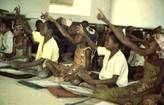Reforms
The reform of educational development remains a central preoccupation for many countries and for international development cooperation.
Whatever a country’s level of development, there is great demand for education reform in order to be able to face political, social and cultural changes, as well as scientific and technological transformations. To this can be added the need for reconstruction in the wake of armed conflicts and social unrest. This often requires large-scale efforts and great resources that must be mobilised through international cooperation.
The reform of the education systems represents human and financial challenges both for the countries concerned and for the international community. At national level, governments, education and research professionals and associated groups work to find adequate solutions. At the international level, multilateral and bilateral cooperation agencies contribute financially and/or technically to the national programmes of educational development.
Reform programmes are complex operations entailing technical and political challenges:
i) Where challenges are great, resources are often scarce. Elaborating a programme requires, above all, the capacity to make difficult policy options and strategies affordable.
ii) Education systems are multidimensional and may be spread across huge geographical areas and a variety of adminstrative levels making them difficult to manage. There are also many different actors and interest groups affected by the decisions in the field of education. The intellectual and technical challenges are often accompanied by political complexities where consensus and compromise are necessary.
Key documents
Secondary Education Policy Research in Asia (SEPRA
UNESCO Bangkok's regional Secondary Education Policy Research project contributes to the development of a regional resource base on secondary education by providing policy relevant information and research to help countries to undertake policy analysis and to formulate secondary education reforms.
Regional Comparative Study on Secondary Teacher Development and Management
Within the framework of the regional project: Secondary Education Policy Research in Asia (SEPRA), Education Policy and Reform (EPR) Unit of UNESCO Bangkok has initiated a regional comparative study to assess how countries in the region are responding to increasing demand to expand access to quality secondary education, with a focus on opportunities and challenges related to secondary teachers. Discussing secondary education from the angle of demand for and supply of teachers brings into focus concrete issues related to both access and quality of secondary education.
Secondary Education Regional Information Base
It is an online collection of resources indented for those involved in reviewing, formulating and implementing secondary education policies and reforms. It covers “Country Profiles” –downloadable in PDF format for each country of the region and “Useful Reading” –a list of relevant documents.

